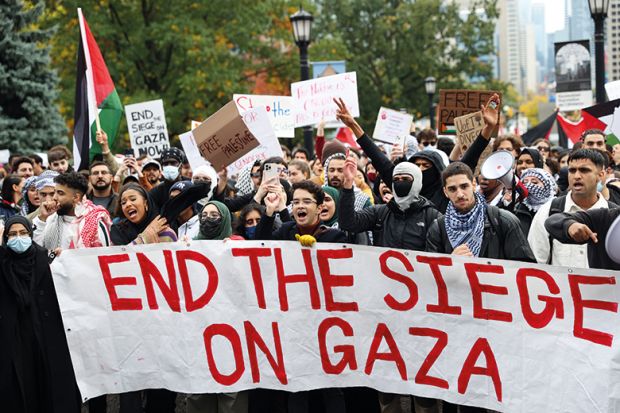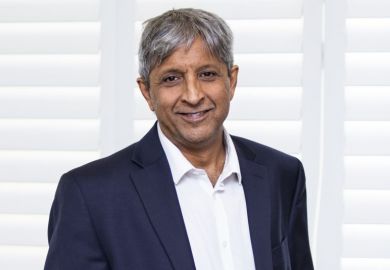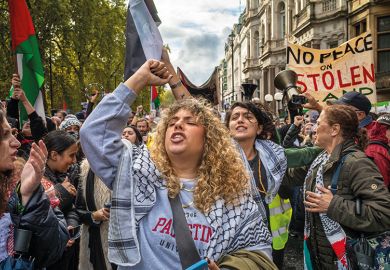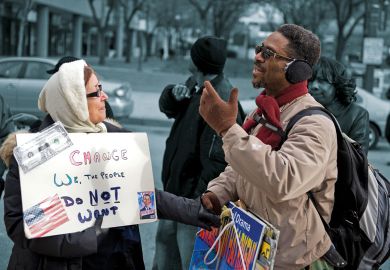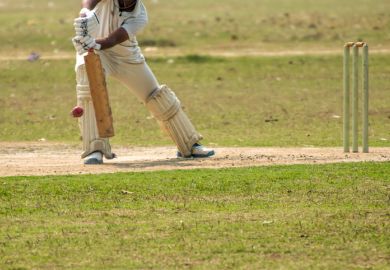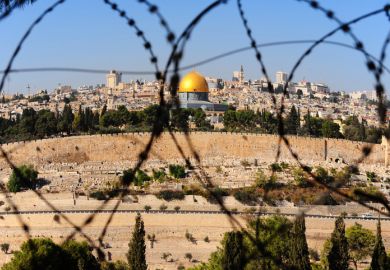“You can point to brawling in the streets of Paris in the 13th century over rivalling theology professors, you can point to town-and-gown brawls in England in the 16th century, never mind the 1968 generation, anti-war protests…”
To Randy Boyagoda, the University of Toronto’s new adviser on civil discourse, campuses have always contained the right ingredients for “controversy and convulsions” throughout the history of higher education – namely lots of young people being brought together at a transformative point of their lives and being asked to “think out loud about difficult things”.
So why has it taken until now for positions such as his – the first in Canada and one of a handful globally – to arise?
The short answer is Gaza. The author and English professor – whose new role will see him develop a plan for events, resources and initiatives designed to promote respectful dialogue – told Times Higher Education that it would be absurd to pretend his appointment was not related to the war and the “deep and corrosive” divisions that it has stirred up.
What makes this situation different from the “convulsions” of the past for Professor Boyagoda, was the “intensification of our connectivity” – young people on campuses receiving real-time information from Israel and Palestine, often about their own families.
“That changes the stakes for someone on a campus, when they’re living through something like that,” he said.
“That sense of connectivity has intensified the always present possibility of protest and controversy that I think to some degree is inherent to university life.”
Toronto, like many campuses, has had its share of free speech controversies. A campus imam, Omar Patel, was dismissed by the institution in January over a social media post linked to the Gaza conflict, which he claims was falsely attributed to him. Meanwhile, students have called for action to be taken against a psychology professor, Stuart Kamenetsky, over historic social media posts that some regard as Islamophobic.
Over all this looms Toronto’s long-standing employment of clinical psychologist, author and now right-wing “provocateur extraordinaire” Jordan Peterson, who resigned from the institution in 2022 but retains emeritus status.
Professor Boyagoda, vice-dean for undergraduates in Toronto’s Faculty of Arts and Science, acknowledged that the furore around Professor Peterson was a “contributing factor” to the university’s spiky campus climate.
But, while he may end up advising the institution on how to handle such dilemmas, he was clear that he did not want to stick his head into situations where he was not welcome – for example, in the middle of a demonstration and counterdemonstration about Gaza.
“It’s like walking into a forest fire and offering a fire safety demonstration,” he said. “It’s offensive and it’s counterproductive.”
Instead, the former president of PEN Canada will “think through situations” with both student groups and academic leaders.
“I see myself not as an authority figure doing this but as someone contributing, making conversations possible that otherwise might not have been possible had I not been in the room,” he said.
Professor Boyagoda said that faculty and student bodies were increasingly looking to their institutions and leaders to issue position statements on global crises – as they largely did over Russia’s invasion of Ukraine, but then were hesitant to do so over the Israel-Hamas war.
But Professor Boyagoda said that “statement culture” was a significant reason why the Palestine crisis had been so “incendiary” on campuses, and argued that institutions should instead stay neutral on such matters.
“I was struck by the immediacy and by the uniformity of the response in the support for Ukraine…it created an institutional precedent for universities demonstrating their public commitment in a geopolitical conflict,” said Professor Boyagoda.
“The threshold or the criteria for making statements has become looser in recent years. It makes more sense to step back and encourage much more rigorous scholarship and public engagement.”
He said the war had forced a recognition from universities that these challenges needed addressing, and that his appointment reflected that, but that civil discourse “wasn’t exactly thriving on 6 October”, the day before the Hamas attack.
“Faculty and students for a variety of reasons are not as capable of thinking out loud together, of recognising and reckoning with difference, and seeing that difference as productive,” he said.
“All of that, which is what I think a university should be about, seems to have been lost in recent years.”
Because universities helped students become productive members of society, Professor Boyagoda said, the world was “clearly seeking” help on this issue – to help graduates have tough conversations and to thrive in the workforce.
“There is a great deal of public interest in the project, because our getting this right strikes me as a responsibility of the university to society at large,” he said.
POSTSCRIPT:
Print headline: Can campus debate about Gaza be civil?
Register to continue
Why register?
- Registration is free and only takes a moment
- Once registered, you can read 3 articles a month
- Sign up for our newsletter
Subscribe
Or subscribe for unlimited access to:
- Unlimited access to news, views, insights & reviews
- Digital editions
- Digital access to THE’s university and college rankings analysis
Already registered or a current subscriber? Login
